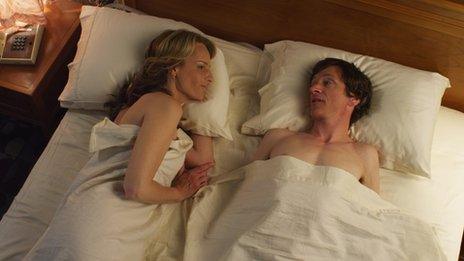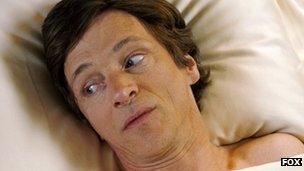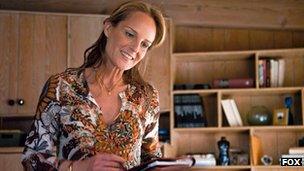The Sessions - let's talk about sex
- Published

Cheryl and Mark's relationship is full of ambiguities
You could be forgiven for thinking a film about a severely disabled man who hires a sex surrogate in order to lose his virginity is not going to be a light-hearted affair.
But while The Sessions, based on the true story of journalist and poet Mark O'Brien, is powerful, poignant and emotional at times, it is also extremely funny.
O'Brien, who lived in Berkeley, California, contracted polio at the age of six and spent most of his life in an iron lung.
Helen Hunt: "I would love this movie to be shown to 16-year-olds"
Despite his physical limitations, O'Brien was determined to live life to the full, which included his dream of having a sex life.
Director Ben Lewin, whose previous films include The Dunera Boys starring Bob Hoskins, came across O'Brien's 1990 article On Seeing a Sex Surrogate on the internet and felt it could be the basis for a film.
"I guess the whole idea of a sex positive movie really surprised me," he says.
"This was probably one of the most meaningful aspects of Mark's life. It wasn't just about having sex - sex was just the beginning. It was about emotional connection."
Avoiding tokenism
Having had polio as a child himself, Lewin could relate to O'Brien but he was determined not to make a film that only spoke to those who had a disability.
"I thought (the film) reflected a universal fear of sex, that awkwardness, what feels good and what doesn't, it's almost like trying to drive a motor car."
Lewin jokes that having had polio made it easier for him to get the job: "I was happy to exploit that!
"But I was looking at it as a film-maker and not in order to vent personal feelings, although that was part of the process."
Lewin cast John Hawkes - who was nominated for an Oscar for Winter's Bone in 2011 - as Mark.

Hawkes says the film is "provocative" and has "a lot of heart"
Was it too difficult to find a disabled actor for the part?
"I felt that if I had chosen a slightly disabled actor to portray a very severely disabled person it would have potentially amounted to tokenism," Lewin explains.
"I really shun political correctness... my responsibility was to make the best film possible."
The film does include disabled actors in smaller roles, such as Jennifer Kumiyama as Carmen, who allows O'Brien to use her house for his therapy sessions.
Hawkes concedes that it was "intimidating" playing a disabled character.
"This character only has a 90 degree movement of his head. So to play the lead in a film with that restriction was a bit of a challenge.
"But the character is so human, so full of life, so funny - irresistible really."
Hawkes's preparation included helping to design a football-sized piece of foam wrapped in duct tape placed on the left side of his back to approximate the curve of Mark's spine.
Playing the sex scenes proved a challenge.
Confused feelings
"I had very little movement below the neck so I was trying to find a way to not be a passive person throughout the intimate scenes - Mark's personality was his body in that way."
Academy award-winning actress Helen Hunt plays sex surrogate Cheryl Cohen-Greene.
Her portrayal has been rewarded with an Oscar nomination in the best supporting actress category.
"I was really attracted to the story. I had a script in my hand that I finished and thought 'that's a beautiful thing'".
Hunt spoke to the real Cheryl as part of her preparation for the role.
"I didn't expect to get that much off the person you play, as an actor.

Hunt's previous films include her Oscar-winning turn in As Good As It Gets and blockbuster Twister
"But the way she approaches her life, optimistic, enthusiastic, supportive, positive... it was infectious."
Of sex surrogacy, Hunt says she knew "exactly nothing".
Cheryl explained that "a surrogate hopes to work with you for a limited number of times and to send you off into the world to have the sexual life that you want to have".
Hunt spends a sizeable proportion of screen time totally naked.
"I used my excitement about the part and my desire to get it right to outweigh the nerves I felt about being naked."
One of the film's many strengths is the ambiguous nature of Mark and Cheryl's relationship - are they falling for each other?
Hawkes says that "Mark does fall for Cheryl but there's different kinds of love, it's a complicated thing.
"Movie love is usually cut and dried but this is unique."
Hunt concurs: "They both get pricked by an errant arrow and both work very hard not to let it distract them from the purpose at hand, which is to send him into his life a more complete human being."
Like her director, Hunt is keen to point out that this is a universal film beyond the issues surrounding disability.
"Disability serves to make the sex in the film more like the sex that all of us have. Improvised and funny and ridiculous and beautiful and all the things that real sex is rather than what's in most movies," she says.
"I'd like them (the audience) to feel less alone in terms of their sexuality. Everybody seems to think they're the only one... to have a desire for something... to be self-conscious, have nerves or whatever.
"I'd like them to enjoy the breath of fresh air that I think this movie is."
- Published29 January 2012